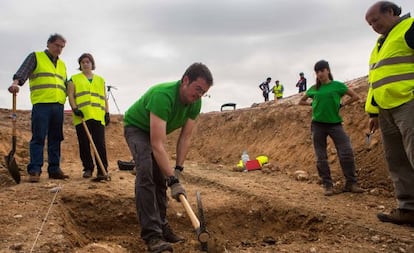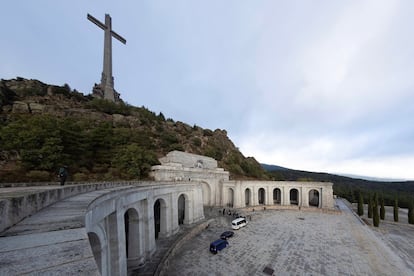Spain to release funds for mass grave exhumations
Government announces €750,000 in grants, nine years after conservatives slashed the budget for historical memory projects
For the first time since 2011, the government of Spain has announced new grants for historical memory projects, which include the exhumation of bodies from mass graves dating back to the Spanish Civil War (1936-1939).
On Wednesday, the Official State Gazette (BOE) published a ministerial order regulating the €750,000 in subsidies that will be available for activities that were placed on hold when the conservative government of Mariano Rajoy, of the Popular Party (PP), withdrew funding.
With that move, Rajoy in practice repealed the 2007 Historical Memory Law, which had been championed by his predecessor José Luis Rodríguez Zapatero of the Socialist Party (PSOE). At the time of passage, the law was strongly opposed by the conservatives, as well as by some leftist parties that felt it did not go far enough.

Now, an administration led by the PSOE in partnership with the leftist Unidas Podemos is allocating new funds for exhumations and other historical memory activities. The executive said there will also be a specific support program for local governments, effective between 2021 and 2024, to help search for people who went missing during the dictatorial regime of Francisco Franco, who governed Spain from the end of the civil war until his death in 1975.
One of the best-known cases is the poet and playwright Federico García Lorca, who was executed at the beginning of the war in Granada. There are still more than 1,200 mass graves left to open in Spain, according to a map available at the Justice Ministry.
The grants will be formally announced in September, and around €400,000, representing 60% of the total budget, will be earmarked for the opening of mass graves and the exhumation of execution victims. Other grants will be available for symposiums and exhibitions on historical memory issues, and for projects that study and disseminate the documentary heritage of the Spanish Civil War and dictatorship.
New law

The Pedro Sánchez administration is working on the draft of a new historical memory law that will include a DNA database and an official list of Civil War victims. The bill incorporates United Nations recommendations and insists on educational aspects, such as the need to teach about democratic memory at schools, said sources familiar with the draft legislation.
Francisco Etxeberria, a forensic scientist who is advising the government and who has worked extensively on Civil War exhumations, has estimated that it might be possible to retrieve between 20,000 and 25,000 bodies from mass graves over a period of four to five years.
The 2007 law offered grants but made victim associations responsible for the entire process of searching and digging up the graves. The United Nations criticized this “privatization” of the exhumation effort, and the Spanish government now wants to get government agencies involved in the process at all levels.
The draft bill also contemplates sanctions for authorities who drag their feet on issues such as removing Francoist symbols from public spaces, and seeks to facilitate public access to documents relating to the war. There are also plans to turn the Valley of the Fallen, a state-run monument built by war prisoners and containing the remains of over 33,800 victims, into a place of memory. In October 2019, the body of Francisco Franco was moved from the Valley of the Fallen to a Madrid cemetery after 16 months of administrative and legal hurdles as Franco’s family fought the move.
English version by Susana Urra.
Tu suscripción se está usando en otro dispositivo
¿Quieres añadir otro usuario a tu suscripción?
Si continúas leyendo en este dispositivo, no se podrá leer en el otro.
FlechaTu suscripción se está usando en otro dispositivo y solo puedes acceder a EL PAÍS desde un dispositivo a la vez.
Si quieres compartir tu cuenta, cambia tu suscripción a la modalidad Premium, así podrás añadir otro usuario. Cada uno accederá con su propia cuenta de email, lo que os permitirá personalizar vuestra experiencia en EL PAÍS.
¿Tienes una suscripción de empresa? Accede aquí para contratar más cuentas.
En el caso de no saber quién está usando tu cuenta, te recomendamos cambiar tu contraseña aquí.
Si decides continuar compartiendo tu cuenta, este mensaje se mostrará en tu dispositivo y en el de la otra persona que está usando tu cuenta de forma indefinida, afectando a tu experiencia de lectura. Puedes consultar aquí los términos y condiciones de la suscripción digital.








































